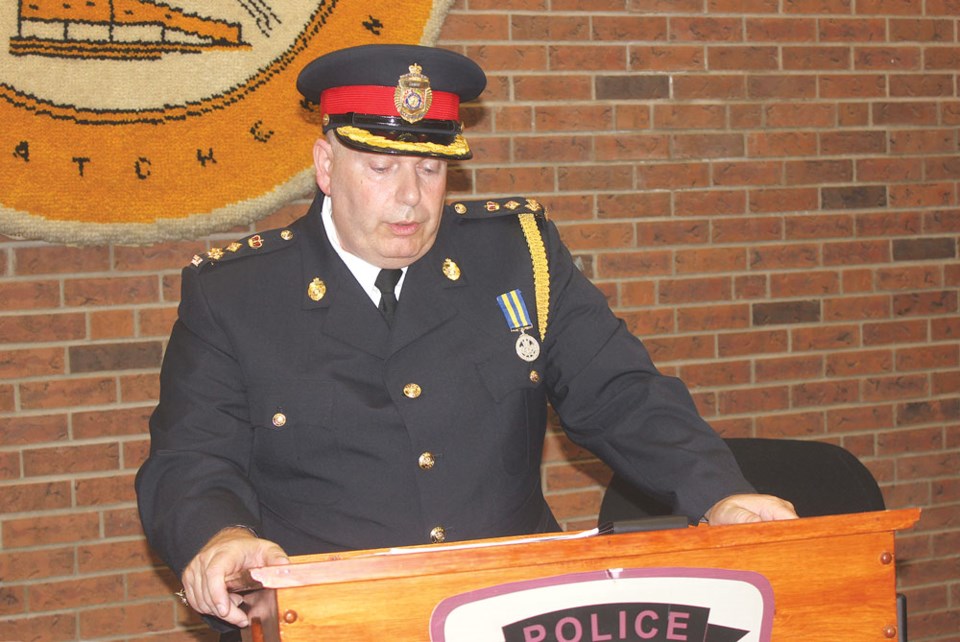Distracted driving is slowly claiming the title of the No. 2 road killer, ceding only to impaired driving. It continues to be a problem in Saskatchewan and is the number 1 contributing factor in collisions overall. There is one main distraction, which almost has become a full-scale addiction for millions.
“We still see a high number of offences when it comes to distracted driving. The primary one that we tend to deal with in Estevan, and I think … across the country, the one that stands out as the most prominent, of course, is cellular phones while people are driving,” said Estevan Police Chief Paul Ladouceur.
According to SGI information, when texting while driving the driver is 23 times more likely to get into an accident than those who don’t. And talking on the phone increases the chances of getting into an accident by three to six times.
Even for experienced drivers, it is illegal to talk, text, view and manipulate hand-held cellphones while driving.
“The law has changed a little while ago where it is an offence simply to hold the cellular device while you are operating the vehicle… The offence used to be ‘using the device,’ but that was difficult to prove that a person was actually texting at the time. The law was changed to allow police more flexibility in enforcing the law, so it was changed to ‘holding the cellular device while driving the vehicle,’” said Ladouceur.
Experienced drivers are allowed to use hands-free devices to talk on the phone or operate it, but only if the device can be activated with voice commands or one touch. New drivers are not allowed to use even those.
Drivers who prefer to disobey the law, have to know that the Estevan Police Service has an out of box way of thinking when it comes to increasing safety on the road.
“We have many ways of detecting if people are driving distracted… We are deploying a number of techniques to curb distracted driving. One of them may be someone standing on the street corner in plain clothes looking in the vehicles as they pass by, that may, in fact, be a police officer looking to see that you are on a cellular device. We have put people on buses in the past, in trucks, where you can easily see into a vehicle,” said Ladouceur.
And if people choose to break the law, drivers should be prepared to pay $280 for the first offence and also lose four demerit points of their licence. The second and further offences within one year will result in a seven-day vehicle impoundment.
“The reality it is very simple: just put down the phone and … use a Bluetooth device. Most new vehicles have that, if your vehicle doesn’t have it, they’ve come down significantly in price and can be purchased as an add-on to any vehicle,” said Ladouceur.
“As far as texting goes, texting and driving has no place in a vehicle… No text is that important that you can’t wait to check it when you stop. If you feel that the text is that important, it’s very simple, pull into the next parking lot and look at it and then go on your way.”
Ladouceur also noted that since it’s now illegal to hold cellphones, people put it on their laps, which takes their eyes completely off the road creating more dangerous situations. He reminded motorists that even when you are stopped at the red light or railways intersection, it’s still not all right to pick up the phone.
“There is no way you can drive a vehicle with due care and attention when you are sending and receiving text messages or talking on the phone.”
Ladouceur outlined that nowadays not only distracted driving but also distracted walking is becoming a serious issue.
“I’ve seen people walking and crossing pedestrian cross-walks with their head down looking at their phones… If you want to put your life in the hands of another driver, hoping that they are paying attention and are not going to miss a red light or something like that, that’s fine, but if you are crossing the street you should be alert,” said Ladouceur.
He also pointed out that police officers are allowed to use hand-held cellphones, but only in particular emergency cases.
“Police are exempt in certain circumstances from this legislation for the simple fact that sometimes our radio system may go down, they may have to rely on the cellular phone to communicate. There are other instances as well where the officer may be communicating directly with the individual that perhaps is considering self-harm, while they are en route to the call and so on and so forth... We encourage our officers: cellphones should be used as the last resort, not a first resort when they are operating a police vehicle, but keep in mind the police do receive extensive driver training,” Ladouceur said.



